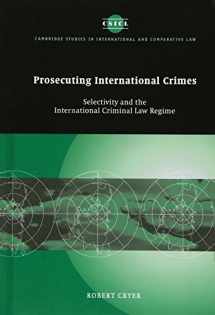
Prosecuting International Crimes: Selectivity and the International Criminal Law Regime (Cambridge Studies in International and Comparative Law, Series Number 41)
ISBN-13:
9780521824743
ISBN-10:
0521824745
Author:
Robert Cryer
Publication date:
2005
Publisher:
Cambridge University Press
Format:
Hardcover
392 pages
Category:
Criminal Law
,
Air & Space
,
Law Specialties
FREE US shipping
Book details
ISBN-13:
9780521824743
ISBN-10:
0521824745
Author:
Robert Cryer
Publication date:
2005
Publisher:
Cambridge University Press
Format:
Hardcover
392 pages
Category:
Criminal Law
,
Air & Space
,
Law Specialties
Summary
Prosecuting International Crimes: Selectivity and the International Criminal Law Regime (Cambridge Studies in International and Comparative Law, Series Number 41) (ISBN-13: 9780521824743 and ISBN-10: 0521824745), written by authors
Robert Cryer, was published by Cambridge University Press in 2005.
With an overall rating of 4.2 stars, it's a notable title among other
Criminal Law
(Air & Space, Law Specialties) books. You can easily purchase or rent Prosecuting International Crimes: Selectivity and the International Criminal Law Regime (Cambridge Studies in International and Comparative Law, Series Number 41) (Hardcover) from BooksRun,
along with many other new and used
Criminal Law
books
and textbooks.
And, if you're looking to sell your copy, our current buyback offer is $0.3.
Description
This 2005 book discusses the legitimacy of the international criminal law regime. It explains the development of the system of international criminal law enforcement in historical context, from antiquity through the Nuremberg and Tokyo Trials, to modern-day prosecutions of atrocities in the former Yugoslavia, Rwanda and Sierra Leone. The modern regime of prosecution of international crimes is evaluated with regard to international relations theory. The book then subjects that regime to critique on the basis of legitimacy and the rule of law, in particular selective enforcement, not only in relation to who is prosecuted, but also the definitions of crimes and principles of liability used when people are prosecuted. It concludes that although selective enforcement is not as powerful as a critique of international criminal law as it was previously, the creation of the International Criminal Court may also have narrowed the substantive rules of international criminal law.


We would LOVE it if you could help us and other readers by reviewing the book
Book review

Congratulations! We have received your book review.
{user}
{createdAt}
by {truncated_author}


